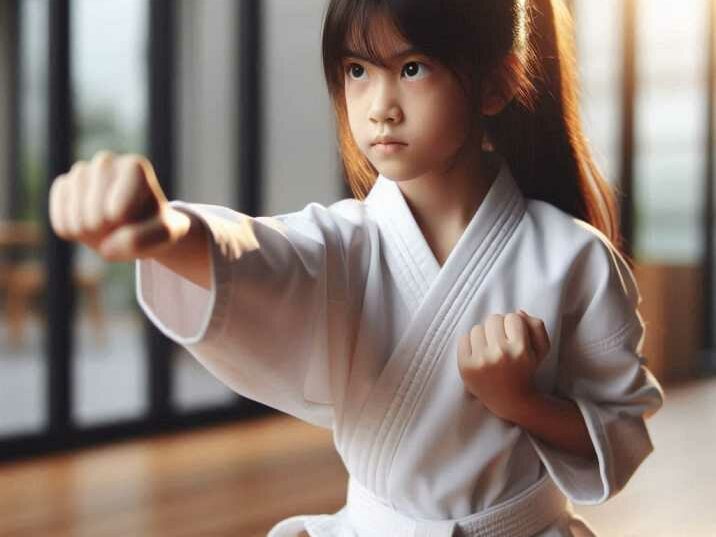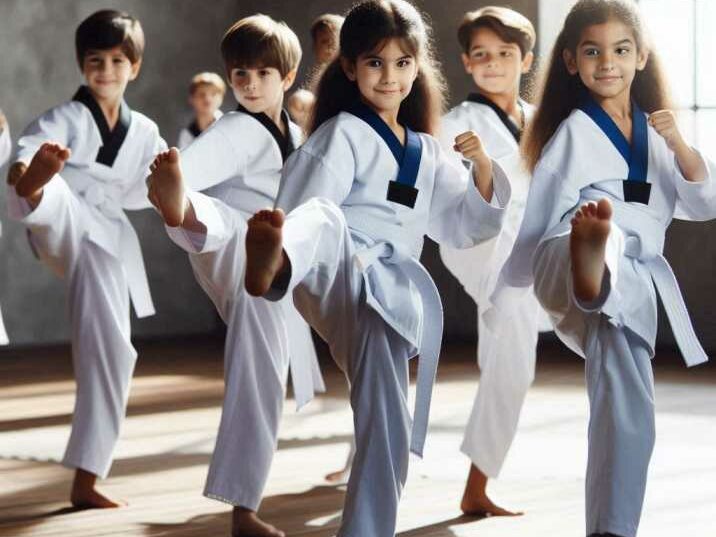Introduction
Table of Contents
Stress and anxiety can affect anyone, including kids. School, friendships, and family can sometimes be overwhelming. Fortunately, martial arts offers a fantastic way for kids to manage stress and anxiety. This practice combines physical activity with mindfulness techniques to help children develop a strong mind and body. In this article, we’ll explore how martial arts can help kids handle stress and provide tips on incorporating these practices into their daily lives.

Table of Contents
- What is Martial Arts?
- The Benefits of Martial Arts for Kids
- Physical Fitness
- Mental Health
- Social Skills
- How does Martial Arts for Stress Management
- Physical Activity and Stress Relief
- Mindfulness Techniques in Martial Arts
- Different Types of Martial Arts for Stress Management
- Karate
- Taekwondo
- Judo
- Brazilian Jiu-Jitsu
- Practical Mindfulness Techniques in Martial Arts
- Deep Breathing
- Visualization
- Body Scanning
- Meditation
- Tips for Parents to Get Started
- Research
- Trial Classes
- Instructor Qualifications
- Safety
- Encouragement
- Case Studies: Real-Life Examples
- FAQs
What is Martial Arts?
Martial arts is a system of practices and traditions that involve combat training. Originating in various cultures, martial arts focus on self-defense, physical fitness, and mental discipline. Popular forms include karate, taekwondo, judo, and Brazilian jiu-jitsu.
The Benefits of Martial Arts for Kids
Physical Fitness
Martial arts is a great way for kids to stay physically active. It helps in improving strength, flexibility, coordination, and endurance. Regular practice can lead to a healthier lifestyle, reducing the risk of obesity and related health issues. Moreover, physical fitness gained through martial arts can help kids perform better in other sports and physical activities.
Mental Health
Martial arts can greatly benefit mental health. Kids learn to set goals, face challenges, and persevere, boosting their self-esteem and confidence. The discipline and focus required during training help them develop better concentration and self-control. Learning to manage their emotions during practice and competitions can reduce symptoms of anxiety and depression.
Social Skills
Practicing martial arts encourages kids to interact with peers and instructors. They learn to communicate effectively, respect others, and work as a team. These skills are essential for building positive relationships and can reduce feelings of loneliness and isolation. Martial arts also promote a sense of community and belonging, which is crucial for emotional well-being.
How does Martial Arts for Stress Management
Physical Activity and Stress Relief
Physical activity is known to reduce stress. When kids engage in martial arts, their bodies release endorphins, the “feel-good” hormones that improve mood and alleviate stress. Martial arts also provides an outlet for releasing pent-up energy and frustration. The structured environment of martial arts classes gives kids a safe space to express and manage their emotions.
Mindfulness Techniques in Martial Arts
Many martial arts incorporate mindfulness and meditation techniques. These practices teach kids to focus on the present moment, reducing anxiety about past or future events. Techniques like deep breathing and visualization help calm the mind and promote relaxation. Regular practice of mindfulness can improve emotional regulation, helping kids handle stressful situations more effectively.
Different Types of Martial Arts for Stress Management
Karate
Karate emphasizes striking techniques, including punches, kicks, and knee strikes. It teaches kids discipline and respect while improving their physical and mental strength. Karate classes often include kata (forms) and kumite (sparring), which help kids practice precision, timing, and control.
Taekwondo
Taekwondo focuses on high, fast kicks and spinning jump kicks. It builds physical agility and mental resilience, helping kids manage stress through structured training and competition. The practice of poomsae (forms) in taekwondo enhances concentration and mindfulness, allowing kids to channel their energy positively.

Judo
Judo is a grappling martial art that involves throws and holds. It teaches kids how to use an opponent’s strength against them, fostering problem-solving skills and strategic thinking. Judo emphasizes mutual respect and cooperation, which can help kids develop empathy and social awareness.
Brazilian Jiu-Jitsu
Brazilian jiu-jitsu is a ground-based martial art focusing on submission holds and grappling techniques. It emphasizes patience and control, which are essential for managing stress. The close-contact nature of jiu-jitsu requires trust and communication between partners, enhancing social skills and teamwork.
Practical Mindfulness Techniques in Martial Arts
Deep Breathing
Deep breathing exercises help kids calm their nervous system and reduce stress. In martial arts, diaphragmatic breathing is often practiced before and after training sessions to promote relaxation and focus.
Visualization
Visualization involves imagining successful performances or peaceful scenarios. Martial arts instructors may guide kids through visualizing themselves performing techniques perfectly or winning a match, boosting confidence and reducing anxiety.
Body Scanning
Body scanning is a mindfulness practice where kids focus on different parts of their body, noticing sensations without judgment. This technique helps kids become more aware of their physical and emotional states, promoting self-regulation.
Meditation
Many martial arts classes include meditation sessions, where kids sit quietly and focus on their breath or a mantra. Meditation can help reduce stress and improve concentration, leading to better emotional balance.
Tips for Parents to Get Started
- Research: Look for reputable martial arts schools in your area. Read reviews and ask for recommendations from other parents.
- Trial Classes: Attend trial classes to see which style suits your child. Observe the class environment, instructor interactions, and how your child responds.
- Instructor Qualifications: Ensure the instructors are qualified and experienced. They should have certifications and a good track record of working with children.
- Safety: Check the school’s safety measures and protocols. The training environment should be clean, well-maintained, and equipped with appropriate safety gear.
- Encouragement: Support and encourage your child’s progress and participation. Celebrate their achievements and help them set realistic goals.
Case Studies: Real-Life Examples
1: Sarah’s Journey with Karate
Sarah, an 8-year-old girl, struggled with anxiety and low self-esteem. Her parents enrolled her in a local karate class. Over six months, Sarah’s confidence grew, and she became more focused and less anxious. The structured environment and supportive community of the karate class provided her with the tools she needed to manage her stress.
2: Jake’s Transformation through Brazilian Jiu-Jitsu
Jake, a 10-year-old boy, had difficulty managing his emotions and often felt overwhelmed by schoolwork. After starting Brazilian jiu-jitsu, Jake learned to channel his energy positively and developed better emotional control. The mindfulness techniques and physical activity in jiu-jitsu helped him become more resilient and focused.
Conclusion
Martial arts is a powerful tool for managing stress and anxiety in kids. By combining physical activity with mindfulness techniques, martial arts helps children develop a strong, healthy body and mind. Encouraging your child to practice martial arts can lead to a happier, more balanced life
FAQs
1. At what age can kids start martial arts?
Most martial arts schools accept children as young as four years old.
2. How often should kids practice martial arts?
Practicing 2-3 times a week is recommended for beginners.
3. Can martial arts help with academic performance?
Yes, martial arts can improve focus and discipline, which can positively impact academic performance.
4. Is martial arts safe for kids?
Yes, when practiced under proper supervision and with the right safety measures, martial arts is safe for kids.
5. How do I choose the right martial art for my child?
Consider your child’s interests, physical abilities, and the type of training each martial art offers.


